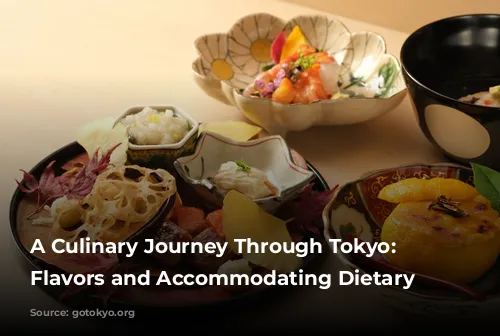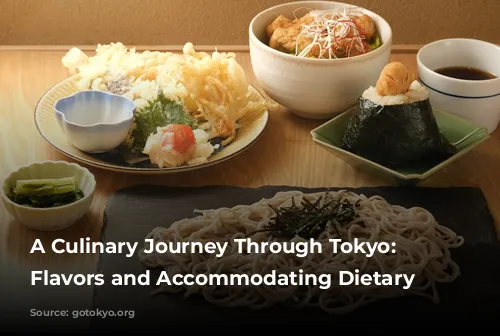Tokyo, the vibrant heart of Japan, is a culinary paradise where tradition and innovation intertwine. Its diverse dining scene is a testament to the rich seasonal bounty of the land and sea, offering a symphony of tastes to satisfy every palate. But what about those with dietary restrictions? Fear not, as Tokyo’s restaurants have embraced inclusivity, catering to a wide range of needs with thoughtful menus and services.

Embracing Traditional Japanese Cuisine
Traditional Japanese cuisine, recognized by UNESCO as an Intangible Cultural Heritage, emphasizes umami, the savory fifth taste. This is achieved through the use of dashi, a flavorful broth that has gained popularity even among those with dietary restrictions. The traditional seasonings like soy sauce, miso, and mirin are increasingly compatible with various dietary needs, allowing a wider audience to experience the essence of Japanese flavors.
However, it’s important to be aware of the subtle nuances of Japanese ingredients. While some dishes may appear meat- and fish-free, they might contain dashi or gelatin derived from animal sources. Additionally, seasonings and emulsifiers can contain animal-based ingredients. Moreover, alcohol plays a significant role in Japanese cuisine, from cooking sake to Japanese rice wine. Even if not explicitly listed, some dishes might contain alcohol-based seasonings or vinegars.

Navigating Japanese Dining Etiquette
To ensure a smooth and enjoyable dining experience, understanding basic Japanese dining etiquette is essential.
- Otoshi: This small dish, similar to an appetizer, is often served automatically before the meal at places like Izakayas (casual dining bars), typically as part of the cover charge.
- Complimentary Water/Tea: As you are seated, you’ll usually be served complimentary water or tea.
- No Outside Food or Beverages: It is customary to enjoy only what is ordered and served at the restaurant.
- Osushibori (Hand Towel): A small wet towel is provided for wiping your hands. It is intended for in-house use only.
- Tatami Rooms: When entering a room with tatami mats, remove your shoes and place them in an orderly manner.
- Ordering Etiquette: It is common to order at least one dish per person.
- Tipping: Tipping is not customary in Japanese restaurants.
- Check Payment: Inquire about settling the bill at the table or at the register.

Tokyo’s Diverse Culinary Landscape
Tokyo is a melting pot of culinary innovation, attracting top chefs from around the world and boasting the highest number of Michelin-starred restaurants globally. This diverse landscape extends to accommodating dietary restrictions.
Vegan-Muslim restaurants are on the rise, even among casual café restaurants. They offer vegan-Muslim versions of popular Japanese dishes like gyoza and karaage, using soybean meat. Vegan restaurants utilize vegetables and seaweed to create savory dishes without animal ingredients. Gluten-free options often feature rice flour, a staple in Japanese cuisine.
Kaiseki restaurants, steeped in the tradition of the Japanese tea ceremony, showcase the artistry of seasonal ingredients. To cater to diverse needs, they provide multilingual booklets explaining the ingredients and etiquettes. Halal Wagyu beef is a popular choice for Muslim guests, while vegetarian and vegan options feature colorful vegetable dishes and gluten-free versions of traditional dishes like tempura.
Soba restaurants, renowned for their buckwheat noodles, offer vegetarian and vegan variations of dashi broth using kombu (kelp). Tempura, typically made with egg batter, can be made without eggs, preserving the signature crispy texture.

Tokyo: A Culinary Destination for All
Tokyo’s world-class dining scene embraces inclusivity. Restaurants are increasingly proactive in accommodating dietary restrictions, offering vegetarian, vegan, gluten-free, and halal options, often with dedicated central kitchens and utensils.
The rich terroir of Japan shines through in the use of organic, pesticide-free, and fertilizer-free vegetables from across the country. Tokyo’s culinary heart beats with a commitment to quality ingredients and authentic flavors, making it a culinary destination for everyone, regardless of dietary preferences. So, embark on a delicious journey through Tokyo’s diverse culinary scene, knowing that your dietary needs will be met with care and consideration.

